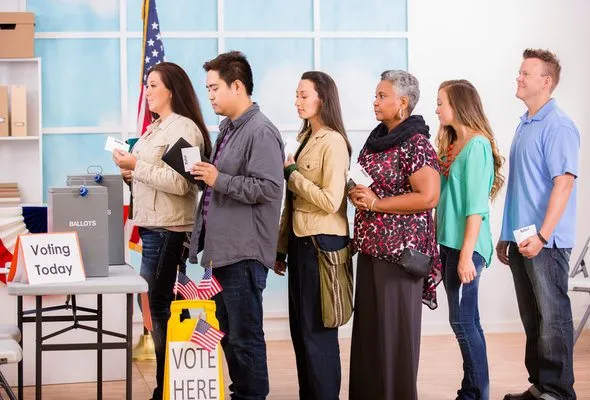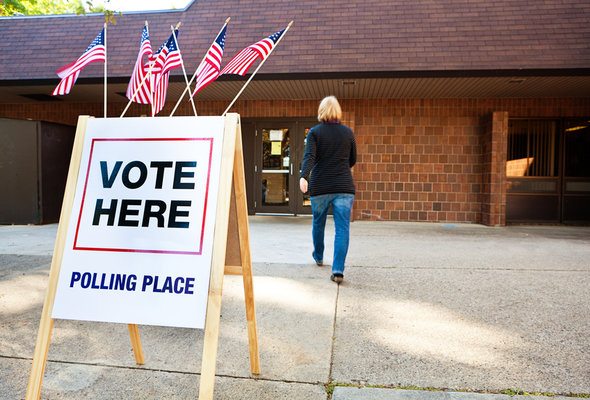When you go to the polls to vote for a president every four years, you’re participating in an indirect vote. Why is it indirect? Well, because of the electoral college. Some say the electoral college is key to maintaining what’s good about U.S. politics, while others want to abolish the institution in favor of a more direct system. Let’s take a look at the pros and cons of the electoral college in the context of modern American politics.
The Electoral College in the Public Debate
The debate over the Electoral College remains a prominent issue in American politics.
On one side of the argument, critics say that the Electoral College can lead to outcomes where the presidency is secured without winning the popular vote.
This is the case for many Democrats and their supporters. According to the Pew Research Center, 80% “favor replacing the Electoral College with a popular vote system.”
This concern stems from the 2000 and 2016 elections, where Democratic candidates won the popular vote but lost the presidency due to the Electoral College system.
As a result, critics say that this mechanism disproportionately amplifies the influence of less populous states and swing states, and effectively sidelines the majority’s choice.
The Pew Research Center says that Republicans and Republican supporters are more evenly divided, with 53% in favor keeping the Electoral College, and 46% wanting to replace it.
Those in favor of the Electoral College say that it ensures all regions of the country are involved in selecting the president. And it prevents candidates from focusing solely on populous urban areas. Additionally, they argue that this system encourages presidential hopefuls to campaign nationwide, addressing diverse interests across states.
Advantages of the Electoral College
The electoral college has a number of pros and cons, depending on where you fall on the political spectrum. While it prevents an easy-to-understand election that would draw from a popular vote, it was originally enacted to give every state its fair say in who gets elected to the highest office in the country. Here are the most relevant benefits:
1. It Keeps Smaller States Relevant in National Politics
Imagine a U.S. presidential election with no electoral college. If only the popular vote mattered, candidates might concentrate their energies on densely populated metro areas like New York, Los Angeles and Chicago. Depending on your perspective, that might sound like a change for the worse. It would mean candidates would have little reason to consider, say, the state of farming in Iowa or the opiate crisis in New Hampshire.
One reason that some analysts support the electoral college is that it encourages candidates to pay attention to small states and not just get out the vote in big, populous states and cities. The electoral college gives small states more weight in the political process than their population would otherwise confer.
2. It Provides a Clean, Widely Accepted Ending to the Election (Most of the Time)

The electoral college, proponents say, makes U.S. presidential elections less contentious by providing a clear ending. There’s no need for a national recount when you have an electoral college.
If one state has voting issues, you can just do a recount in that state rather than creating national upheaval. And to win, a candidate must garner the support of voters in a variety of regions. That means whoever wins the presidency must build a truly national coalition. This, in turn, helps promote national cohesion and the peaceful transfer of power between presidents and helps keep the nation’s political system stable.
3. It Makes it Easier for Candidates to Campaign
If you’re a Democrat running for president, you don’t have to spend too much time or money wooing voters in left-leaning California. The same goes for Republican candidates and right-leaning Texas.
The fact that certain states and their electoral votes are safely in the column of one party or the other makes it easier and cheaper for candidates to campaign successfully. They can focus their energies on the battleground states. Some argue that getting rid of the electoral college could make American presidential elections even more expensive than they already are, exacerbating what some see as America’s campaign finance problem.
Disadvantages of the Electoral College
In politics, there are very few things that make everyone happy. The electoral college is no different as there are a few cons that need to be considered. Here are the most important cons to the electoral college.
1. It Can Make People Feel Like Their Votes Don’t Matter
In the electoral college, it’s true that not every vote matters. A Democrat in California who gets stuck in traffic and doesn’t make it to the polls probably shouldn’t beat themselves up. The same can’t be said for a voter in Florida, Ohio or another swing state.
U.S. voter participation rates are already quite low. Some argue that eliminating the electoral college would be an easy way to raise them and boost Americans’ engagement in the political process.
2. It Gives Too Much Power to Swing States
If you follow U.S. federal elections and you don’t live in a swing state, you might find yourself grumbling that some voters get all the attention. If you don’t live in a swing state like Pennsylvania, Florida, Ohio, Michigan, Wisconsin and more, you probably won’t see as many ads, have as many canvassers come to your door or get polled as frequently. The electoral college means that swing states – which aren’t necessarily the most representative of the country as a whole – get most of the attention.
And even within swing states, certain counties are more competitive than others. That means voters in those counties are courted particularly hard. If that offends your sense of fairness and you think that candidates should fight for the votes of all Americans, you may oppose the electoral college. In fact, this result has ended up creating the same thing that the electoral college is supposed to prevent, which is candidates focusing on a few specific areas.
3. It Can Clash With the Popular Vote

Remember the 2000 election when Al Gore won the popular vote, but lost the electoral college, and therefore the presidency? That was enough to turn some Americans off from the electoral college forever.
If the U.S. eliminates the electoral college, that scenario would never happen again. The potential for the electoral college to conflict with the result of the popular vote is one of the most commonly cited arguments against the electoral college.
4. There Remains the Possibility of “Rogue Electors”
Many states have no law requiring electors to vote the way their state has voted. Electors in these states are “unbound.” Therefore, the electoral college is based on a set of traditions that electors vote the way their state votes.
However, there’s always the possibility of “rogue” or “faithless” electors who could give a vote to a candidate who didn’t win the elector’s state. This also worries critics of the electoral college.
Pro or Con: It Keeps the Two-Party System Strong
This one is either a pro or a con, depending on your point of view. The electoral college helps keep the two-party system strong. It makes it very hard for a third party to break through at the national level and increases the risk that a third party could spoil a candidate’s chance of winning, which in turn discourages people from voting for third-party candidates.
Some analysts credit the two-party system with keeping American politics stable and driving candidates to the political center, while others would like to see a multi-party system takes hold in the U.S. So, depending on where you stand with regard to the two-party system, you’ll probably have corresponding feelings about the electoral college.
Bottom Line
Will the U.S. decide to eliminate the electoral college? It’s hard to say. There’s a movement to encourage states to split their electors in proportion to the percentage of the state vote that each candidate gets. While that wouldn’t eliminate the electoral college, it would change the winner-take-all nature of our system and the way candidates think about state campaigns. Time will tell whether that reform – and others – come to pass.
Financial Tips for You
- SmartAsset does more than cover the electoral college. We can help you with many aspects of your finances, including investing, financial planning, retirement and more. If you have specific questions about your personal financial situation, consider meeting with a financial advisor. Finding a financial advisor doesn’t have to be hard. SmartAsset’s free tool matches you with vetted financial advisors who serve your area, and you can have a free introductory call with your advisor matches to decide which one you feel is right for you. If you’re ready to find an advisor who can help you achieve your financial goals, get started now.
- Taxes are one area of your finances that the federal government can directly affect. Stop by SmartAsset’s federal income tax calculator and paycheck calculator to estimate what you’ll owe at tax time.
Photo credit: ©iStock.com/YinYang, ©iStock.com/SteveChristensen, ©iStock.com/Pamela Moore
